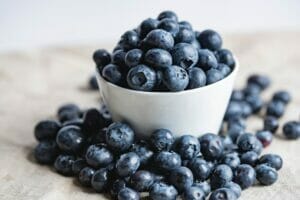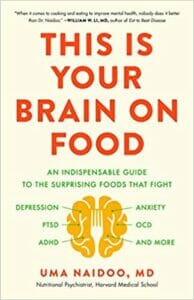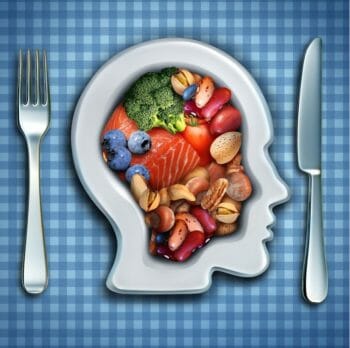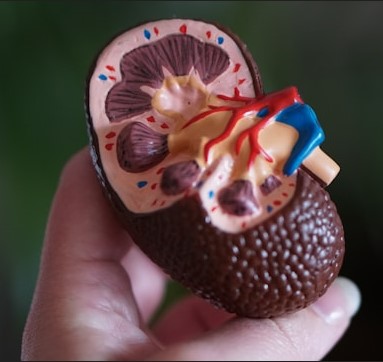Your Brain on food is a new paradigm in medicine (even though it is an ancient concept). There is an important movement in psychiatry called nutritional psychiatry. It seems common sense, but, few psychiatrists prescribe “food” as part of their treatment plan. I hope this is changing!
 Your Brain on Food
Your Brain on Food
Did you know that blueberries can help you cope with the aftereffects of trauma? That salami can cause depression, or that boosting Vitamin D intake can help treat anxiety?
When it comes to diet, most people’s concerns involve weight loss, fitness, cardiac health, and longevity. But what we eat affects more than our bodies; it also affects our brains.
Feeding Your Second Brain
Remember we have two brains! A better title for this article would be “Your Brains on Food”. Serotonin is a neurotransmitter that helps regulate sleep and appetite, mediate moods, and inhibit pain. Since about 95% of your serotonin is produced in your gastrointestinal tract, and your gastrointestinal tract is lined with a hundred million nerve cells, or neurons, it makes sense that the inner workings of your digestive system don’t just help you digest food, but also guide your emotions.
 Nutritional Psychiatry
Nutritional Psychiatry
Nutritional psychiatry is eating for your better mental well being.
Recent studies have shown that diet can have a profound impact on mental health conditions ranging from ADHD to depression, anxiety, sleep disorders, OCD, dementia and beyond.
A triple threat in the food space, Dr. Uma Naidoo is a board-certified psychiatrist, nutrition specialist, and professionally trained chef. In This Is Your Brain on Food, she draws on cutting-edge research to explain the many ways in which food contributes to our mental health, and shows how a sound diet can help treat and prevent a wide range of psychological and cognitive health issues.
 This Is Your Brain on Food
This Is Your Brain on Food
Packed with fascinating science, actionable nutritional recommendations, and delicious, brain-healthy recipes, This Is Your Brain on Food is the go-to guide to optimizing your mental health with food.
The deep suffering that comes from depression, anxiety, dementia, PTSD, obsessive compulsive disorder, and other conditions can be relieved through dietary changes, all based on solid science. Each chapter takes us on a journey through mental well-being that surveys the market, menu, and spice cabinet. A unique leader in the food-as-medicine field.





























